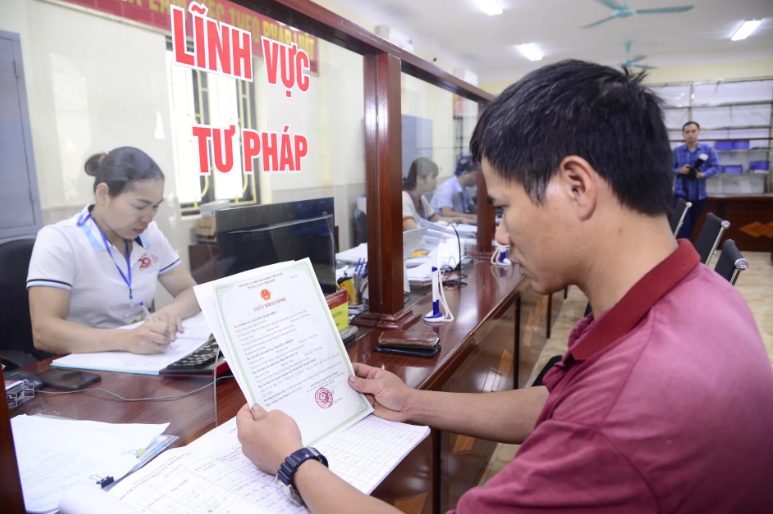Vietnam to cut 30% of business conditions this year
Digital transformation will be adopted by agencies to minimize processing times for administrative procedures related to land use, planning, investment, construction, taxation, customs, and more.
THE HANOI TIMES — The government has set a target of cutting the time required for administrative procedures, compliance costs, and business conditions by at least 30% this year.

Citizens complete administrative procedures at the One-Stop Service Center in Ung Hoa District. Photo: Pham Hung/The Hanoi Times
This objective is outlined in Resolution 139, issued on May 18, which details the Government’s implementation plan for resolutions related to private sector development.
According to this resolution, ministries, agencies, and local authorities must improve the business environment and reform policies related to licensing and corporate insolvency. These reforms are key to promoting private sector growth.
All relevant authorities must conduct a review to eliminate unnecessary business conditions and overlapping regulations that hinder the development of the private sector. The government's mandate includes reducing the time required for processing administrative procedures, compliance costs, and business conditions by at least 30% this year, with further reductions expected in subsequent years.
Digital transformation will be adopted across agencies to minimize processing times for administrative procedures related to land use, planning, investments, construction, taxation, customs, and more.
Between 2025 and 2026, pre-emptive inspections will no longer be required for the issuance of permits and certificates, and follow-up inspections will be implemented instead. This means that regulatory bodies will only publish essential business conditions, except in sectors where inspections are mandatory for licensing under international practices. Public services must also be provided to businesses and individual entrepreneurs, regardless of administrative boundaries. Ministries and local authorities must review and categorize inspection jurisdictions to eliminate overlapping and duplicate inspections of the same subject matter.
Inspections at enterprises, business households, and individual entrepreneurs, including inter-agency inspections, will be limited to once a year, unless there is compelling evidence of violations requiring an ad hoc inspection. Misuse of inspection authority to harass or burden businesses will result in strict penalties. To minimize in-person inspections, online and remote inspections will be prioritized.
Under Resolution 139, the government assigned specific tasks to each ministry. This year, the Ministry of Public Security is responsible for finalizing a draft decree to guide the implementation of the Data Law, which aims to enhance data sharing and facilitate online and remote inspections and supervision.
The Ministry of Finance will review the list of conditional business lines under the Investment Law and eliminate the unnecessary ones by December 31, 2026. It is also responsible for finalizing policies that support businesses' land rental costs during the 2025–2026 period.
The Ministry must amend Decree 35/2022 to include provisions requiring industrial parks to lease at least 20 hectares, or 5% of their total area, to high-tech businesses, startups, and small-to-medium enterprises. Guidelines on land rent support, corporate income tax exemptions, and related policies must be finalized by the end of the year.
The Ministry of Agriculture and Rural Development has been tasked with revising the Land Law and related regulations to control fluctuations in land prices for non-agricultural and business use. Local authorities will be required to allocate land for infrastructure development in industrial zones, clusters, and technology incubators in order to support high-tech small- and medium-sized enterprises and startups.
The national land database must be completed and integrated with relevant data centers this year.
The State Bank of Vietnam and the Ministry of Finance have been instructed to submit proposals for a 2% annual interest rate subsidy for private enterprises, business households, and individual entrepreneurs. These loans, which will be provided through commercial banks and extra-budgetary state financial institutions, will support green and circular economy projects that align with environmental, social, and governance (ESG) standards.












